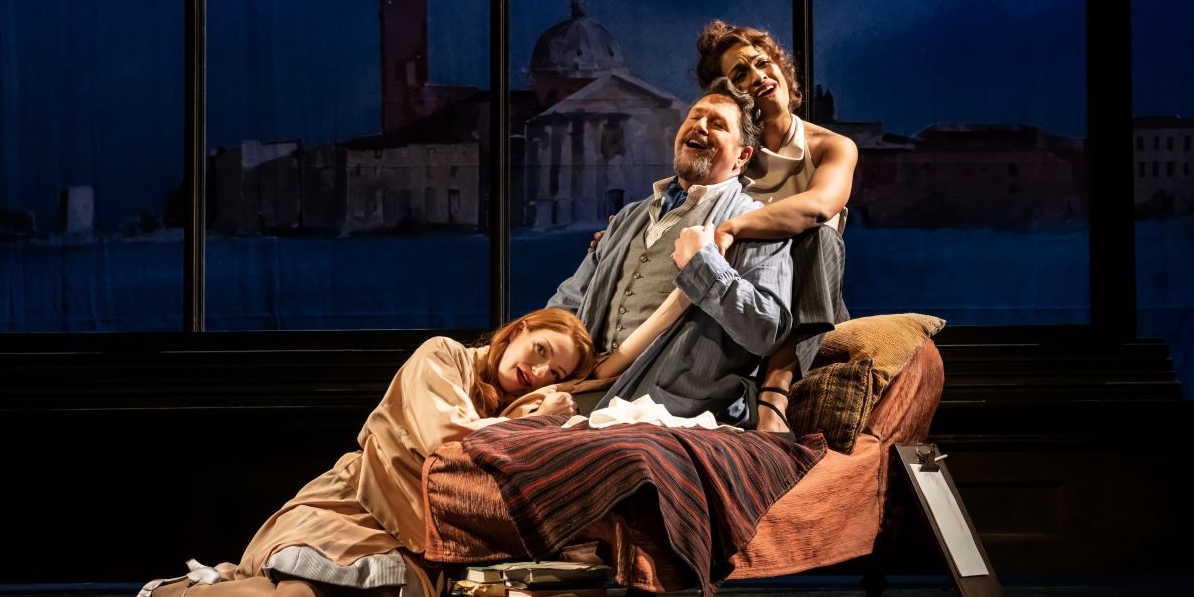‘Aspects of Love’ was a great success at the back end of the 1980s, helping to make the name of Michael Ball through his association with its hit number ‘Love Changes Everything’. This revival is essentially Ball’s project, and indeed he returns in the older of the two male leads, with the song transferred to him as well, as part of a pattern of both continuity and updating. But the real issue is whether the show deserves revival on its own merits, and here, despite heroic efforts by the superbly talented cast and creative team, I have my doubts.
The problem is that the interplay of the characters is unconvincing, emotional motivation is implausible, and – most seriously – the sexual politics that were acceptable in the days of the Bloomsbury Group that inspired this story have receded into history in a way that leaves some of the interactions both unbelievable and borderline distasteful. No one expects the plots of musicals, any more than those of operas, to be an authentic mirror of modern realities, but there are limits; and when you have sections of the audience laughing at points where clearly humour was not intended, you realise there is a serious disconnect between credibility and the emotional matrix of the show.
The story covers a cross-generational love triangle (or possibly quadrilateral!) focused on a famous actress, Rose, who accepts the attentions of much-younger fan, Alex before getting together with his uncle, George, with whom she has a daughter, Jenny. She in turn falls for Alex, once he returns to their lives in the French countryside after an absence of twelve years. Various more temporary lovers hover in the background, notably Giulietta, a worldly Italian artist, and long-time companion to George, and possible squeeze of Rose. As you can see, it is quite hard to keep up….
This a production of brilliant surfaces and slick technique, and the strength of these qualities needs to be recognised. Jonathan Kent brings his usual efficient professionalism to bear on the 38 short scenes, presiding over a colourful varied pageant of locations and moods. He has recruited the famous opera designer John Macfarlane who provides a visual feast of backgrounds and one rapid scene change after another. Paris, Venice, a villa in Pau, theatre dressing rooms and circus tents all pass across our eyes in rapid succession with the aid of a revolve and gliding screens. There is a smooth flow of events that represents a real technical feat given the possibilities of fragmentation in the scenario.
The musical side of things is very strong too. This is one of Lloyd Webber’s lushest scores with several fine numbers over and above ‘Love Changes Everything,’ that deserve to be heard more often. It is mostly a through-written work which places considerable demands on the singers and on the orchestra. There has been quite a lot of fuss in the press about the new orchestrations, but to my ear they were entirely successful and suitable to the intimate chamber-scale of the piece and with many delectable solos for the woodwind in particular. Cat Beveridge directs a fine band, placed behind a scrim at the back of the stage, revealed to us at odd moments for no discernible reason.
All the singers distinguish themselves vocally. Ball segues effortlessly into the role of George, still demonstrating vocal heft when he needs it. It is excellent to see the admirable Laura Pitt-Pulford given a starring West End role, which she carries off with panache and emotional depth, particularly in ‘Anything but Lonely’, the final number of the evening. Opera singer Danielle de Niese is luxury casting for the relatively minor role of Giulietta, but she enhances every scene she is in with acting skills as polished as her singing. Anna Unwin makes the most of the somewhat underwritten and implausible character of Jenny, and Jamie Bogyo sings with great purity of tone as Alex.
So if you are looking for night out at a West End musical that is a guaranteed and sophisticated glide through the conventions of the genre, this show will tick all the right boxes. But if you are looking for a show where the drama is credible and engaging and the transition between words and music emotionally inevitable and convincing, this will not suffice.

